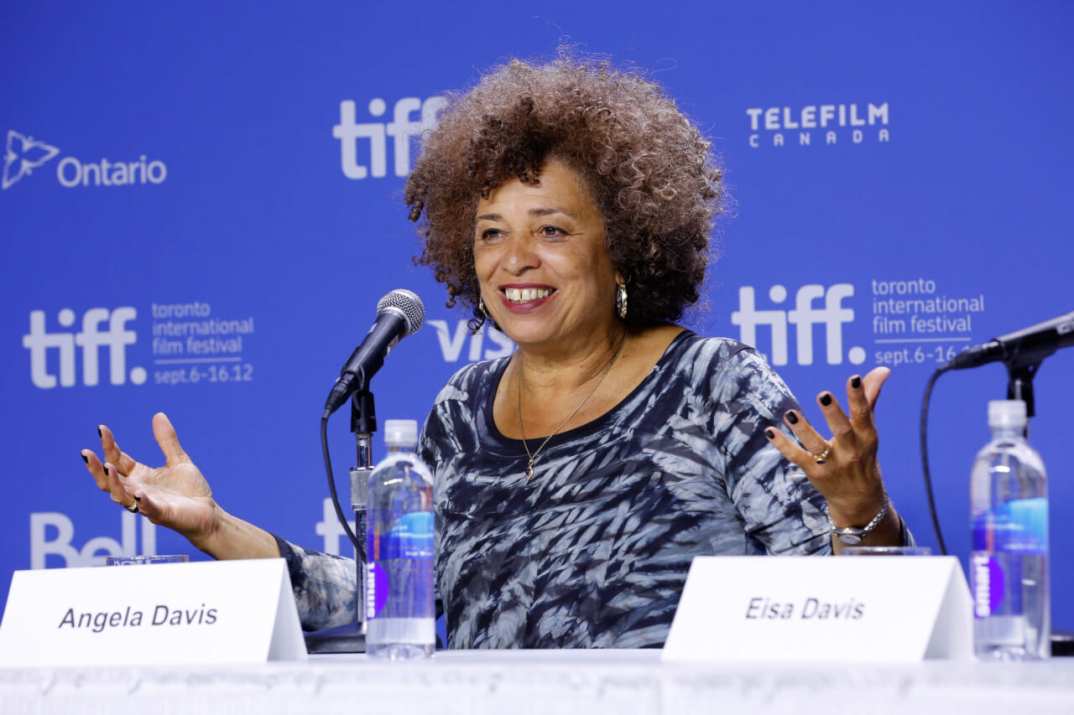Angela Davis lands digital Vanity Fair cover, interviewed by Ava Duvernay
Davis, a living testament to the resilience of Blacks in America, opened up to the critically acclaimed writer-director-producer.

Angela Davis, a civil rights leader and living testament to the resilience of Blacks in America, sat down with critically acclaimed writer-director-producer Ava Duvernay for Vanity Fair’s special edition cover story.
Through this interview, Duvernay offered 76-year-old Davis an opportunity to bridge the gap between her younger days as an activist and where the world is right now politically. She tied in the racial unrest following the shooting deaths of George Floyd with the impact of COVID-19.
Read More: ‘Black Lady’ creator Robin Thede signs first-look deal with Warner Bros. TV
“When George Floyd was lynched, and we were all witnesses to that—we all watched as this white policeman held his knee on George Floyd’s neck for eight minutes and 46 seconds—I think that many people of all racial and ethnic backgrounds, who had not necessarily understood the way in which history is present in our lives today, who had said, “Well, I never owned slaves, so what does slavery have to do with me?” suddenly began to get it,” said Davis. “That there was work that should have happened in the immediate aftermath of slavery that could have prevented us from arriving at this moment. But it did not happen. And here we are. And now we have to begin.”
Davis was born on Jan. 26, 1944, in Birmingham, Alabama, which was still very segregated. She is the daughter of an entrepreneur father and an educator mother, who was an active member of the National Association for the Advancement of Colored People.
Read More: Biden launches ‘Shop Talk’ series roundtable to engage with Black men
Davis briefly mentioned her upbringing and talked about how mentorship and community helped shape her into the leader and woman we see today. She also related current happenings in the world directly to institutional videos that leave disenfranchised Americans unsupported.
“The protests offered people an opportunity to join in this collective demand to bring about deep change, radical change. Defund the police, abolish policing as we know it now. These are the same arguments that we’ve been making for such a long time about the prison system and the whole criminal justice system,” she said. “It was as if all of these decades of work by so many people, who received no credit at all, came to fruition.”
Since adolescence, Davis has been taking different initiatives to combat discrimination. She’s experienced the compounded inequalities Black women face and continues to witness systemic oppression. Over the years, Davis has stepped deeper into her role as a civil rights leader, centering her work around race, gender equity, prison reform and education.
“Virtually every institution seized upon that term, ‘diversity.’ And I always ask, ‘Well, where is justice here?’ Are you simply going to ask those who have been marginalized or subjugated to come inside of the institution and participate in the same process that led precisely to their marginalization? Diversity and inclusion without substantive change, without radical change, accomplishes nothing,” she told Duvernay.
Read More: FBI: Trump’s mail-in ballot interference accusations not supported by evidence
Davis was charged with aggravated kidnapping and first-degree murder in connection with the 1970 death of Superior Court Judge Harold Haley, who was among those kidnapped by Jonathan Jackson from a courtroom in Marin County. Davis supported and was connected to Jackson’s brother, George, through her affiliation with the Black Panther Party.
Once Davis was found after hiding out for months, she showed up to court with her afro intact and declared her innocence. Davis and her team convinced the all-white jury of her innocence, and she was acquitted in June of 1972.
Vanity Fair‘s special edition cover story comes at a time where many world leaders are taking public stances against inequality. Recently, Davis joined Boots Riley and others to speak at The Port of Oakland on Juneteenth 2020 in celebration of the 155th anniversary of freedom and to rally against police brutality.
“I’ve always recognized my own role as an activist as helping to create conditions of possibility for change. And that means to expand and deepen public consciousness of the nature of racism, of heteropatriarchy, pollution of the planet and their relationship to global capitalism,” said Davis.
In addition to authoring several books and previously working as a professor at University of California Santa Cruz, Davis continues to write, travel, lecture and lead. She is also the co-founder of Critical Resistance, an organization working to end the prison industrial complex.
“This is the work that I’ve always done, and I’ve always known that it would make a difference,” Davis expressed to Duvernay. “Not my work as an individual, but my work with communities who have struggled. I believe that this is how the world changes. It always changes as a result of the pressure that masses of people, ordinary people, exert on the existing state of affairs. I feel very fortunate that I am still alive today to witness this.”
